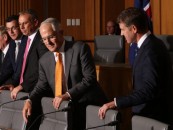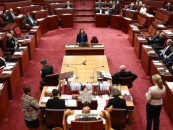Free trade? sounds fair
November 12, 2014WHAT would you think if Victoria prohibited the importing of Queensland bananas because Queenslanders refused to buy Victorian milk, preferring to prop up their own dairy farmers?
What if the Victorians only allowed sugar from NSW because farm workers were paid on comparable terms to Victorian farm workers, whereas in Queensland they were not?
All of these scenarios are impossible because the constitution says free trade between the states shall be “absolutely free”, with the states prohibited from imposing levies and customs duties. While governments may regulate trade within a state, interstate trade within Australia remains free.
When the constitution was being written, there was no guarantee the free traders would prevail over the protectionists. While NSW was firmly committed to free trade, Victoria had established a high level of protection for its industries and South Australia and Tasmania were not far behind, leading to considerable friction between the colonies. Trade was a key issue in federation negotiations.
Many of the arguments used in those late nineteenth century debates are heard today in the context of international trade. It is not a level playing field. People will lose their jobs, farms, livelihoods. Free trade must be mutual. We cannot have free trade when costs (labour, taxes and rules) are not the same. It is all very unfair.
Indeed, the question of fairness has been seized upon by those who oppose free trade to promote the concept of “fair trade”. An entire industry has grown up around it, managed by well-funded lobby groups, dealing in so-called fair trade products.
The French economist and writer Frederic Bastiat famously said, “When goods don’t cross borders, armies will”. In 1901, at the time of federation, several states had customs posts on border crossings to control the interstate movement of goods and to extract duties and excises. The potential for conflict (as well as smuggling) was real.
The transformation of China from a closed economy, suspicious of the outside world, to a semi-market economy keen to engage with the world has sharply reduced the risk of conflict. Whereas an attack on Taiwan was once thought inevitable, for example, both sides now have far too much trade at stake.
The new Abbott government’s determination to pursue bilateral free trade agreements with our Asian neighbours, particularly China, has seen the same old protectionist arguments emerge. It is not a level playing field. Jobs will be put at risk. We should insist they adopt our labour standards (presumably including the latest CFMEU or AWU agreement). We should demand equivalent concessions.
The thing is, the only issue that ought to be on the mind of our negotiators is access to export markets.
In terms of Australian interests, the best thing would be to remove all barriers to foreign imports apart from health and safety. The only reason to pretend we might restrict them is to convince other countries to drop their restrictions.
Evidence for this is right under our noses. The Victorian dairy industry is far more efficient than the industry in the other states, with the cost of freight the only reason it does not already supply most of the country’s milk. On the other hand, Queensland is far better at producing pineapples and bananas. While they can be grown in the southern states, the cost of production is higher.
If the states imposed trade barriers to protect local production, consumers would pay higher prices and have less to spend on other goods and services. This would reduce growth, prosperity and employment.
The same applies to international trade. If we can import goods from China or Indonesia cheaper than they can be sold by local producers, we should do it. It leads to growth, prosperity and jobs. The local producers need to either lift their game or find another one. Keeping them in business by keeping out competitor imports is equivalent to welfare, for which we all pay.
As for only allowing fair trade, that’s no different from calls to only allow foreign investment that is in the “national interest”. The questions that nobody wants to answer are: fair to whom? And who decides?
I’m all in favour of fair trade provided I’m the person deciding what’s fair. I’m also in favour of having a national interest test on foreign investment provided I’m the one deciding what’s in the national interest. I would not need long.
But I couldn’t trust anyone else to decide. They might impose their own version of fair, forcing me or those I care about to pay higher prices. And to me, that’s not fair.
David Leyonhjelm has been an agribusiness consultant for 25 years and was recently elected to the Senate. He may be contacted at reclaimfreedom@gmail.com








